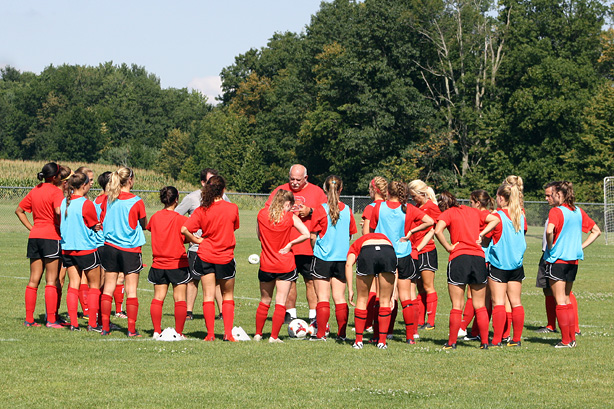
Head coach Patrick Farmer addresses the Big Red at the team's first practice of the season Aug. 23 at McGovern Fields. Photo: Cornell Athletic Communications/Brandon Thomas.
Patrick Farmer rebuilds women's soccer program
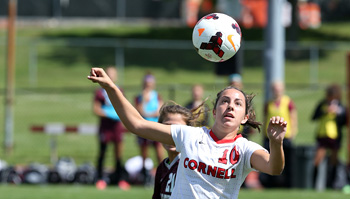
Kelly Abrams '15 has become a fixture at central defense for the Big Red this season after starting just five games in her first two seasons on East Hill. Photo: Cornell Athletic Communications/Darl Zehr.
It didn't take long for the Cornell women's soccer program to start winning when it was established in 1982. The program's founding head coach, Randy May, led the Big Red to a .500 winning percentage or better in Ivy League play 11 times over a stretch of 12 seasons. During that run, Cornell tied for first in the league twice and had four All-Americans -- including first-team selections Laurie Collier in 1986 and Jennifer Smith in 1988.
Simultaneous with this success on East Hill was the development of a powerhouse program on South Hill. Ithaca College soccer was fledgling in 1987 when a new head coach took over the reins and led the program to national Division III titles in 1990 and 1991. That coach would later be inducted into the Ithaca College Sports Hall of Fame. That coach was Patrick Farmer who, more than 20 years later, is in his second year of remolding Cornell women's soccer.
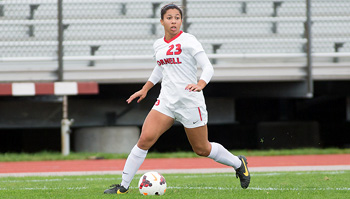
Taylor Wright '17 is one of the three freshmen playing key roles on defense or in goal for the Big Red. Photo: Cornell Athletic Communications/Patrick Shanahan.
It was toward the end of May's 18-year tenure that Big Red women's soccer's fortunes began to turn. Following an undefeated Ivy season in 1995, Cornell had failed to break .500 in league play since. May's final season with the Big Red was in 1999, and the next three coaches were unable to direct the team to better than a sixth-place finish in the eight-team Ivy League.
Farmer and May became close friends and remain so to this day, despite the different directions coaching has taken them. Farmer developed a reputation for building women's soccer programs from the ground up. After his tenure at IC, he started the program at Penn State in 1994 and had the Nittany Lions winning its first of three straight Big Ten titles in 1998 and into the national semifinals in 1999. Future stops included two years in pro soccer, more rebuilding projects at Tennessee Tech and Syracuse, and then four years as an assistant coach at Wisconsin.
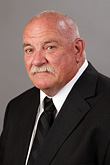
Patrick Farmer
Farmer would have stayed in Wisconsin, but "my best friend is the guy who started the program," he says of May. "So the idea of trying to put it back into proper order seemed interesting to me. Plus, I get to be back home."
Farmer had no problem learning his new phone number in Bartels Hall when he was hired in 2012 because he had dialed it so many times to chat with May. "The first phone call I made as the head coach here was to Randy. I called him up and told him I moved his desk," Farmer says.
Soon after that call came the business of rebuilding the Big Red, which hadn't won multiple games in the Ivy League since 2002. The shifting of head coaches wasn't going to be the only adjustment to Cornell women's soccer. At the top of the list was changing the competitive culture. Farmer planned to emphasize more competition and training, and he wanted to immediately transform the team's mentality -- from hoping to win to expecting to win.
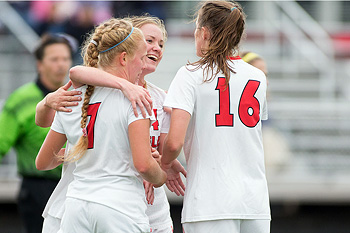
From left, Elizabeth Crowell '17, Brenna Mockler '16 and Claire MacManus '15 celebrate one of the Big Red's goals in a 4-0 victory over New Jersey Institute of Technology Sept. 22 at Berman Field. Photo:Cornell Athletic Communications/Patrick Shanahan.
Results have come relatively quickly. After posting just one win in 2012, the Big Red rattled off seven wins in its first 11 games in 2013. The team has been particularly gratified by demonstrating its improvement by beating Sacred Heart, Albany, Binghamton and Columbia -- all teams Cornell had lost to a season earlier.
"I've been happy with it. I think they changed around their attitude pretty quickly how to be competitive," Farmer says. "It's top-down-driven. A couple younger players start playing, and all of the sudden there starts to be a little more competitive vibe. Now you have to win your spot."
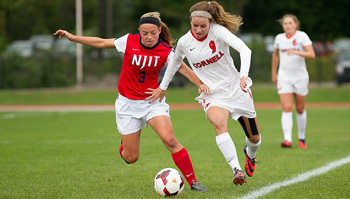
Dempsey Banks '17 maneuvers around a defender in a 4-0 victory over New Jersey Institute of Technology Sept. 22 at Berman Field. Banks is one of four members of the team with at least 10 points this season. Photo: Cornell Athletic Communications/Patrick Shanahan.
The talent of the newcomers has been hard to miss, too. Farmer's first recruiting class at Cornell has yielded five players in starting roles this season -- forward Dempsey Banks, midfielder Elizabeth Crowell, defenders Taylor Wright and Kailey Joyce, and goalkeeper Kelsey Tierney, all Class of 2017.
Of course, the results of the 2013 season aren't the final goal -- the Ivy League title is. But the program has traction as it lines up recruits for future years. The next steps, as Farmer sees them, are to fortify the defense and have consistently better performances on the road. He should know -- he's done it before.